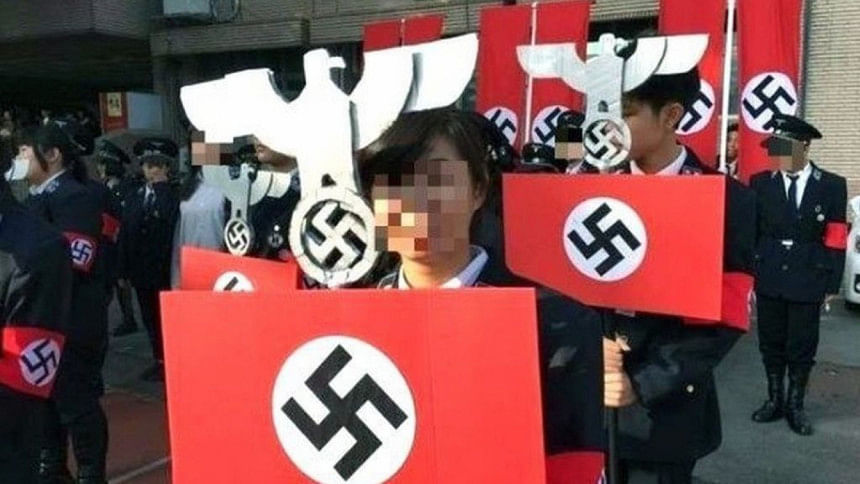The problems behind Taiwan's 'Nazi parade' scandal

A school event in Taiwan came to the forefront of international media last week. A group of students from a private high school wore self-fashioned Nazi uniforms and wielded swastika banners at their school's "Christmas and Thanksgiving Costume Parade" on December 23. Photos taken at the parade served as fodder for a heated debate on PTT, Taiwan's largest online forum. When one netizen forwarded the photos to the Israeli representative office in Taipei, the debate escalated into a diplomatic affair.
The Israeli representative office condemned the display of Nazi paraphernalia as "deplorable and shocking" and called on Taiwan to initiate programs to teach students about the Holocaust. The Presidential Office apologised for the presentation, which it described as "disrespectful to the Jewish people's suffering at the hands of war and representative of ignorance toward modern history." The Ministry of Education also responded by threatening to cut subsidies to the school. Before the day ended, the school's principal had apologised for the school's negligence and failure to educate the students. He resigned the next day.
The parade was widely criticised in Taiwanese society, but there were also people who questioned why representations of Nazis deserved universal and high-profile condemnation in a nation where people seemed to have no problem role-playing, or even outright worshipping, other authoritarian figures such as Taiwan's former President Chiang Kai-shek.
Taiwan's complicated history means that some of its citizens have a less-than-straightforward interpretation of World War II history. Taiwan came into the war technically as part of the Axis powers, as it was a colony of the Japanese empire. Taiwan was handed to the Republic of China by Japan after the latter's defeat in the war. However, this "retrocession" – which, incidentally, the high school in question (Kuang-fu Senior High School) is named after – is regarded by a number of people in Taiwan as merely a change of rulers. The ambivalence of Taiwanese people toward their national identity remains one of the biggest sociopolitical issues in the nation.
Just as the event was going the way of all gaffe-prompted scandals in Taiwan -- with strong reactions, public condemnations, heads rolling and the public moving on to the next buzz topic -- some of the school's students released a strongly-worded online response rallying for support for the resigning principal and challenging the government. In the post, the students said that they did not deserve such public humiliation as they had "done nothing wrong" and were simply taking part in a "costume event." They questioned why they were expected to understand taboos about Hitler, as they were Taiwan-born citizens who only loved their country and high-school students whose only concern was to finish school. They concluded by challenging President Tsai Ing-wen for siding with Israel and Germany while punishing her own people.
Instead of drumming up support for the principal, the article was criticised even by people who regarded the government's response as heavy-handed, who decried the students' astonishing lack of civic consciousness in a global community, their narrow mindedness and blatant nationalism. Online sleuths continued their probe into the school and released video footages of other racially discriminating parades held in the school Christmas events in the past.
While the online post revealed the students' lack of understanding of the significance of holding a mock Nazi parade, it also demonstrated that they were not heartless teenagers who cared nothing about other people's suffering. The students wrote the post out of concern for their principal, who was reportedly beloved at the school and demonstrated care for his students by assuming full responsibility for the scandal. They could have hidden behind the principal, who offered his own head to shield them from public pressure, but they decided to take responsibility, regardless of how ill-advised they were.
The "why should I care" attitude demonstrated by both the students who staged the rally and those who penned the response reflect the failure of Taiwan's utilitarian education system, in which school is regarded as little more than a two-decade vocational training program. Students have little respect for history lessons because they are trained to view the subject as a series of facts that will allow them to pass an exam.
In fact, these students are the victims of a shallow utilitarianism that prevails in Taiwan. President Tsai recognised this in her first response to the incident on December 29, saying that "the students are not at fault, the fault lies in (us) grownups."
Ironically, such utilitarianism is evident in the government's response to the Nazi parade controversy. The Ministry of Education's first reaction was to threaten to cut funding for a school that clearly needed more support. The government approached the incident purely from a political and diplomatic point of view. The students who organised the display and those who responded clearly lack civic sensibilities and historical knowledge, but they were right to feel that, instead of receiving guidance for their errors, they had been thrown under the bus by a government that handled the event merely as a PR scandal to be contained.
The writer is Executive Deputy Editor-in-Chief, The China Post, Taiwan.

 For all latest news, follow The Daily Star's Google News channel.
For all latest news, follow The Daily Star's Google News channel. 



Comments